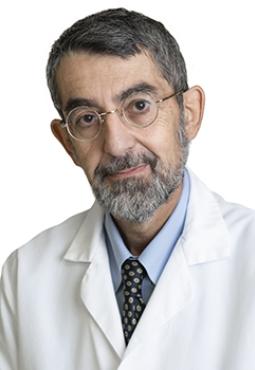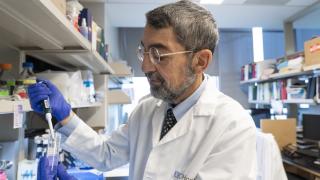Alberto Pugliese, M.D., has joined City of Hope as the Samuel Rahbar Endowed Chair in Diabetes & Drug Discovery, chair of the Department of Diabetes Immunology and director of The Wanek Family Project for Type 1 Diabetes within the Arthur Riggs Diabetes & Metabolism Research Institute.
Pugliese has dedicated his 35-year career to studying type 1 diabetes from the preclinical period to clinical diagnosis and afterward, including islet cell transplantation. His work has contributed to a greater understanding of genetic and cellular mechanisms that regulate immunological self-tolerance, specifically to molecules targeted in diabetes. Pugliese has provided seminal contributions in the field of type 1 diabetes genetics, immunology, pathology and clinical trials, and his work has been published in major international journals.
“City of Hope is fortunate to welcome Dr. Pugliese, as he shares our dedication to advancing type 1 diabetes research through scientific excellence, open collaboration and the training of new investigators,” said Debbie C. Thurmond, Ph.D., director of the Riggs Institute and Ruth B. & Robert K. Lanman Chair in Gene Regulation & Drug Discovery Research.

Pugliese comes to City of Hope by way of the University of Miami, where he served as The J. Enloe and Eugenia J. Dodson Chair in Diabetes Research. He was also a tenured professor of medicine in the Division of Diabetes Endocrinology and Metabolism, and a professor of microbiology and immunology, as well as serving as deputy director for immune tolerance research at the Diabetes Research Institute, Leonard Miller School of Medicine, University of Miami.
“I am humbled and honored to join City of Hope’s legendary diabetes research department that has made pivotal discoveries about diabetes for more than 50 years,” Pugliese said. “My team and I will continue to enhance that spirit of innovation and scientific pioneering, digging deeper into the secrets of genetics and the immune system, metabolism and diabetic complications.”
The Search for Cures
In coming to City of Hope, Pugliese joins the legendary diabetes research department that has made pivotal discoveries about diabetes for more than 50 years. Pugliese and his team will continue to enhance that spirit of innovation and scientific pioneering, digging deeper into the secrets of genetics and the immune system, metabolism and diabetic complications.
“Searching for a cure is a core value that is strongly footed at City of Hope, at the Arthur Riggs Diabetes and Metabolism Research Institute,” Pugliese said. “I was attracted by the strong, diverse research environment in which many leading researchers operate, including those that study diabetes and/or cancer, and by the substantial institutional commitment and resources.”
A native of Italy, Pugliese earned his medical degree and postdoctoral research fellowship at the University of Palermo. He completed postdoctoral research fellowships at that university, and then trained with the late George Eisenbarth at the Joslin Diabetes Center at Harvard Medical School and the Barbara Davis Center for Childhood Diabetes at the University of Colorado Health Sciences Center.
A Collaborative Approach
Pugliese is a champion of collaboration and team-science approaches, which has been recognized by the Helmsley Charitable Trust with the George S. Eisenbarth nPOD Award for Team Science. He has served on research grant review committees of the National Institutes of Health (NIH), the JDRF and other funding organizations internationally. He also served as chair of the American Diabetes Association’s Grant Review Panel. He has been a steering committee member of the Type 1 Diabetes TrialNet, a clinical trial network funded by the NIH, under which auspices he has chaired several committees and initiatives.
“It is mind blowing what we have learned about type 1 diabetes that we did not know 30 years ago, or even 10, five or even one year ago.” Pugliese said. “For example, scientists have identified genetic factors, developed genetic and immune markers of the disease process, described the disease natural history — and based on these findings, have been able to advance toward prevention and treatment of the disease process after diagnosis. We now have better tools to advance new therapies and information that guide us toward which therapies should be tested — when, how and in whom — depending on disease stage.”
Pugliese is also executive co-director of the JDRF Network for Pancreatic Organ Donors with Diabetes (nPOD), a collaborative project that recovers tissues from organ donors with type 1 diabetes and distributes samples to investigators worldwide to support a comprehensive understanding of the disease.
